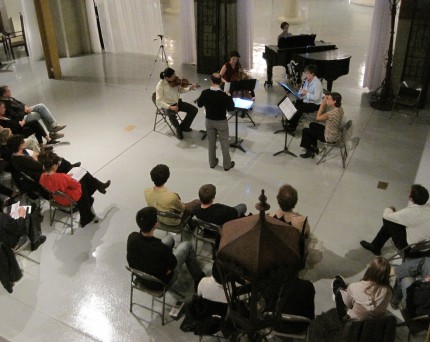ACM opens season with challenging program in striking new venue
Access Contemporary Music opened its season Tuesday night with a challenging, finely balanced performance by the Palomar Ensemble.
The news for ACM this year is its spectacular new space, a soaring three-story atrium in the vast Architectural Artifacts emporium on Montrose, where all this season’s concerts will be held. Seating tends to be in a semicircle by necessity but the acoustic has great vibrance and clarity. Intrepid urban excavators can also have a fine time digging through the carved moldings, stained glass and even antique theater chairs before taking in some cutting-edge music.
With ACM executive director Seth Boustead as the congenial host, the evening of music (“Architectonics”) for mixed strings, winds and piano spanned just over an hour but gave those in attendance plenty to chew on, with four deftly contrasted works played with bracing skill and concentration under the direction of Francesco Milioto.
The title suggests some weighty philosophical freight, yet Alexandra Gardner’s The Way of Ideas is that rarest of things, a charming contemporary chamber work. Scored for flute, clarinet, violin and cello, The Way of Ideas has an attractive buoyant style yet with an insistent momentum, suggestive of early Michael Torke. A contrasted middle section offers an introspective cello solo before the rambunctious opening music returns. Miloto led a vital rhythmically energized reading with especially fine playing by flutist Alicia Poot and cellist Alyson Berger.
Lewis Spratlan’s When Crows Gather was inspired by a massed group of the title birds that congregated one fall morning outside the composer’s window. Crafted in nine unbroken sections and scored for hard-working sextet (violin, cello, piano and three clarinetists doubling on E-flat and bass clarinets), Spratlan’s serial style is less thorny here than in some of his other works.
I found When Crows Gather much more interesting than Spratlan’s deadly opera, Life is a Dream. The writing shows ingenuity with the pitch intervals, varied meters, and high violin harmonics contrasted with more inward string passages. The concluding avian cacophony is robust and cleverly scored with the wind players called on to play (uncanny) bird sounds on their mouthpieces. There is a haunting Ives-like section near the end when what sounds like an old American folk ode is heard from a distance. Spratlan’s difficult work received first-class advocacy by the gifted Palomar players under Milioto’s exacting direction.
It’s striking how much powerful music has been written by forcibly exiled composers, from such figures as Stravinsky, Rachmaninoff, Schoenberg and Korngold in the last century to Giya Kancheli and Chinary Ung today. In Ung’s case, the Cambodian composer sought political asylum in the West and all of his family were murdered by the Khmer Rouge.
Part of an extended series, Ung’s Spiral VI is scored for clarinet, violin, cello and piano. There’s an Eastern Asian musical sensibility in the shifting tonal center and pentatonic feel of the music. Amid the chaotic collision of conflicting lines and meters, the music rises in perfect fifths from C sharp to G major suggesting an exotic muezzin-like call to prayer with peaceful cello and violin solos. Spiral VI ends with a feeling of solace in the hushed coda, and it’s a testament to the human spirit that the composer, who turned 70 this year, can create such communicative and even optimistic music against such a tragic background.
The largest and most rewarding work of the evening was Static by Sebastian Currier. One of our finest living composers, the world premiere of Currier’s Sleepers and Dreamers at the Grant Park Music Festival this past summer proved a highlight of the musical year.
Currier’s music is serious and powerful without being pretentious. His style has sharp contemporary edges with a piercing resonance and impact but remains accessible and consistently compelling, a journey that often takes you on unexpected twists and turns.
Static, says the composer, is “a kind of Rorschach test,” scored for violin, cello, piano, clarinet (doubling bass clarinet) and flute (doubling piccolo). “Is it of something unchanging and in a state of equilibrium?” Currier asks. “Or is it of the erratic white noise that interferes with a radio signal?” Outwardly an expanded large-scale sonata form in six movements, there’s a double meaning of electronics as well as psychological unease as reflected in the movement titles.
A somber introduction of held notes (“Remote”) and minimalist piano figures make for a ghostly prelude, leading to the haunting and evocative “Ethereal” section. The schizoid dislocation of “Bipolar” is unmistakeable, jumping from a brooding quietude to manic activity, with a plangent clarinet solo sounding like a desperate plea for inner peace. There is a searching quality in “Resonant” with its introspective violin solos and a sense of subsumed tragedy. In the final section (“Floating”) the music moves from insistent fugal figures to an austere melancholy and ultimately a sense of unsettled mystery, with the quiet, spare notes slowly ebbing away.
Like most Currier works, this is extraordinarily difficult music to perform with nowhere to hide. Miloto led a performance of textual clarity and laser-like concentration with terrific playing by all particularly violinist Jeff Yang and pianist Hulya Alpakin.
ACM’s next program “Acoustic Resonances” will be presented Oct. 16. acmusic.org.
Posted in Performances





